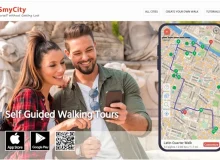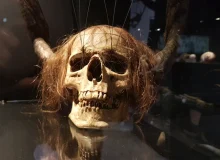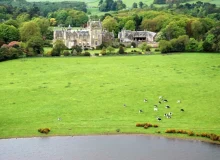The Cunning Gators of Mobile Bay
Mike Gerrard visits Mobile Bay where wildlife ranges from sharks to black bears… and cunning alligators.
If asked to name the biggest river delta in the Lower 48 US states, most people would probably get it right and say the Mississippi. But the second biggest? It’s Mobile Bay in Alabama, which is so aquatically biodiverse it’s been called North America’s Amazon. You’ll find up to 500 species of birds here, and every kind of wildlife from sharks to black bears.
These and other facts come tumbling from the lips of Chris Wiber, our guide on a boat tour of a tiny part of Mobile Bay (which is of course pronounced mo-beel and not mo-bile). We’re less than ten miles from the centre of Mobile and Chris had only just switched on the engine when we see an osprey, then a pair of them on a nesting platform on top of a telegraph pole.
‘They winter in the Caribbean or South America,’ Chris tells us, ‘and they just got back here, In fact just before you guys got here they were making baby ospreys. They’re about 4 lbs but they can carry a fish about 2.5 lbs. They can dive at 60mph and can go up to 3ft underwater. They mate for life. They go separately to their winter place, so they’re pleased to see each other when they return.’
The osprey are followed by sightings of a brown pelican sitting on a post, and then a heron.
‘That’s the great blue heron,’ Chris tells us. ‘He’s 4’6″ tall and has a 7-foot wingspan.’
It’s a mild late February day. I’m in Mobile for Mardi Gras, the oldest in the United States (Take that, New Orleans), but a trip to the delta provides an escape from the parades and partying, a total contrast to the bead-catching and the buzz. Apart from Chris’s narration and the murmur of the engine, there’s quiet out on the water.
‘By area,’ Chris says, ‘Alabama is more diverse than any other state. There are more types of freshwater fish here than anywhere in the USA. Alabama has 99 species of crawfish, more than anywhere else on the planet. It has more freshwater shellfish and more snails than anywhere in the world. Mobile Bay is also the rainiest place in the Lower 48.’
Not today, it isn’t, as February in Mobile is like a British summer’s day, with suntan cream essential most days.
‘By late summer these places are teeming with shark, both blacktip and bull sharks. We also have black bears in the delta.’
Chris points out a black willow tree.
‘The bark has salicylic acid in it, and the Native Americans used it to treat headaches and other complaints. It’s from this that aspirin was developed.’
We see a snowy egret, and Chris then tells us the amazing story of the cunning delta alligators. It was in Mobile Bay in 2013 that the first evidence of reptilians using tools was ever filmed. At nesting time egrets would be flying around looking for sticks and twigs for nesting material. The gators would lurk beneath the water holding a stick in their jaws, and just when the egret thought he’d got a stick the gator got a snack.
‘We’re not seeing any gators today,’ Chris says, ‘but it’s a great day for birdwatching. We saw our first roseate spoonbill the other day. There’s a crow over there. You know, crows are the smartest creatures on the planet. We see lots of bald eagles here too.’
The only gator we saw all morning was in the Nature Center that’s close by the WildNative tours office. It was stuffed. But gators or not, there’s a mesmerising relaxing quality about being out on the water, watching for wildlife. It should be proscribed therapy for anyone suffering from anxiety. In the distance, across the vast expanse of the bay, we see a road bridge, which we head towards and pass under.
‘That,’ Chris tells us, ‘is the 6th-longest bridge in the USA. The Jubilee Parkway is 8 miles long and opened in 1978. The Jubilee isn’t your usual jubilee but it’s an Alabama event when fish, shrimp, crabs and various sea creatures suddenly swarm into Mobile Bay. It happens usually at least once a year, and when it does we have parties, and catch lots of fish.’
We’ve been escaping our Mardi Gras party for a few hours, and it’s been a total delight. Who knew that Alabama had such diverse wildlife, and such an incredible body of water?
‘Before we end our visit,’ Chris says, ‘I want to share with you the two most amazing things I know about Alabama. The name ‘mobile home’ comes from Mobile. A local company started making and advertising them, and they were first called Mobile homes, but everyone thought it was mobile homes. And that company was called Sweet Homes Alabama, which is where Lynyrd Skynyrd got the title of their song from.’
As soon as I got home I checked both those facts out. He was right.
How to Get There
The author’s boat tour was with WildNative, who are at 30841 Five Rivers Boulevard, near Spanish Fort, about nine miles east of Mobile.
Photos
All photos (c) Mike Gerrard









